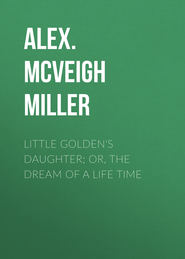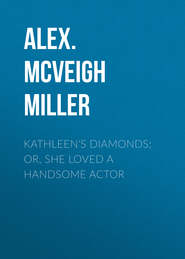По всем вопросам обращайтесь на: info@litportal.ru
(©) 2003-2024.
✖
Pretty Geraldine, the New York Salesgirl; or, Wedded to Her Choice
Настройки чтения
Размер шрифта
Высота строк
Поля
"No," she answered, carelessly.
"Have you heard anything about him?"
"No, indeed, and I had almost forgotten the man until you recalled him to my mind," she returned, fibbing unblushingly.
"Ah! Then you will not mind what I have to tell you?" deprecatingly.
"Of course not. What is it?" carelessly.
"Well, of course, I thought it rude and strange his not keeping his appointment with you, and thinking something might have happened to the fellow, as you feared, I made some indirect inquiries at the engine-house, and found that he had returned to Newburgh the same day he brought you back to New York."
"Indeed?" she returned, with a paling cheek, whose pallor she could not control.
"Yes, he had gone back, but I did not like to tell you the truth. I waited for developments. But, to-day, I met Mrs. Stansbury on the street, and she told me something—well, see if you can guess?"
"Something very amusing, no doubt," she replied, carelessly.
"She told me she had just returned from Newburgh, and that she had left Hawthorne there, courting her sister, Daisy Odell. It seemed that he had been in love with the pretty little black-eyed thing some time, and fearing that she might get jealous of the attentions he had to pay you the day you were thrown on his care by my accidental desertion, he returned to make his peace with her, and has been lingering by her side ever since. Mrs. Stansbury was vastly amused over it all, and said to me, 'He flirted shockingly with that pretty little salesgirl, didn't he? but I hope she knew it was only fun! Give my love to her when you see her again!'"
Geraldine treated the matter with a seeming careless indifference, but, oh! the tumult of wounded love and pride that raged within her girlish breast!
"I was so fond of that woman, and she was only kind to me for the sake of a little amusement," she thought, with hot and burning cheeks at his tone when he repeated Mrs. Stansbury's contemptuous epithet, "that little salesgirl!"
To herself she said, angrily:
"I will not be a poor salesgirl any longer, to be twitted with my humble position in life. I will become an actress, and my talents will make me famous, so that these people will go to see me act, and be proud to say, 'I knew her once, but she is so rich and grand now that she would not stoop to renew the acquaintance.' As for Harry Hawthorne, who knows but that I may be able to pay him back some day for the slight he put on me! I am no longer grateful to him for saving my life; for why should he have saved it, only to plant a thorn in my heart?"
But she did not tell Cissy what the actor had told her about Harry Hawthorne. She could not bear to confess her humiliation.
But she went with Standish to the park the next day, and while skating on the lake a vision of beauty and grace that attracted the eyes of admiring hundreds, she told him that she had decided to go with the company on the road.
"Although Cissy is very angry with me, and vows that I will repent it in dust and ashes," she added, uneasily.
"Don't listen to her croaking. She only envies your good fortune," he returned, reassuringly. "Why, you will soon be rich and famous, Miss Harding, for your beauty and talent will win you rapid promotion on the boards. Do you see how all those strangers have watched you on the ice to-day? It is because your face has already won you the sobriquet of 'the prettiest salesgirl in New York.' Soon it will be changed to 'the prettiest actress on the stage.' Will not that sound better?"
CHAPTER X.
A CRUEL DISAPPOINTMENT
"Love, dear friend, is a sacred thing!
Love is not tinsel, silver or gold!
Love is a fragment of Heaven's own gate,
Broken in halves by God's hand, Fate,
And given two kindred spirits to hold
Who would colonize in our earth unknown,
'Tis whispered them: 'You may be thrown
Far apart—'"
Harry Hawthorne remained in the Bellevue Hospital ten days only, it having been discovered that his injuries were not internal, as at first feared.
His temporary unconsciousness had resulted from the severe cut on his head, and as this healed nicely, he grew better, and asked for his discharge from the hospital. Indeed, he would have recovered sooner but for a painful suspense and anxiety that augmented fever and restlessness.
The young fireman had been so deeply smitten by the charms of pretty Geraldine, that during his enforced confinement, the thought of her had never been absent from his mind. Love had sprung to life full grown within his breast.
When he was discharged from the hospital, he could not wait until evening to call on her. The ready excuse of the need of a pair of gloves took him to O'Neill's.
He did not wear his fireman's dress, but attired himself in an elegant suit of clothes, such as gentlemen wear to business. Thus arrayed, and looking as much the aristocrat as any Fifth avenue millionaire, he entered the store and went at once to the glove counter, his heart throbbing wildly at thought of seeing Geraldine again, and making an appointment to call on her that evening.
A whole row of smiling, pretty girls confronted him, but among them all he could not see his heart's darling, the lode-star of his dreams—sweet Geraldine.
He accosted the nearest girl—a plump, gray-eyed beauty—who fortunately proved to be Miss Carroll.
"I wish to have Miss Harding show me some gloves. Is she here?"
Cissy Carroll shook her dark head, and answered:
"Geraldine does not attend here any more. Can I show you the gloves?"
"If you please," he replied, and as she placed them before him, he took a pair, mechanically, in his shapely hand, but continued:
"I beg your pardon, but has Miss Harding gone to another store? She is a friend of mine. I wish to see her very much."
"Your name?" asked Cissy, with a quick suspicion of the truth, for he realized in his person Geraldine's description.
"I am Harry Hawthorne."
"I thought so. And I am Miss Carroll. Perhaps you have heard Geraldine speak of me?"
He smiled, and answered:
"Yes, as her 'chum Cissy.' She told me, also, that you roomed together."
"We did—but Geraldine has left me now."
She read the palpable disappointment on his face, and added, quickly:
"She had a talent for acting, and has gone upon the stage."
She saw him start as if she had struck him a blow in the face, and he grew lividly pale, as he asked:
"At what theatre?"
"Oh, she has left New York, and gone on the road with a stock company—the one that played 'Hearts and Homes' two weeks here. You may remember Clifford Standish, the leading man. He procured the situation for Geraldine."
Then, as she saw from his face that he was taking it quite hard, she added, with womanly curiosity:
"But how happens it that you are not acquainted with these facts? The papers had some very flattering paragraphs about the beautiful salesgirl who had left a New York store to adopt a stage career."
"I—I—haven't read the papers," he murmured, faintly, like one recovering from a blow.
"Have you heard anything about him?"
"No, indeed, and I had almost forgotten the man until you recalled him to my mind," she returned, fibbing unblushingly.
"Ah! Then you will not mind what I have to tell you?" deprecatingly.
"Of course not. What is it?" carelessly.
"Well, of course, I thought it rude and strange his not keeping his appointment with you, and thinking something might have happened to the fellow, as you feared, I made some indirect inquiries at the engine-house, and found that he had returned to Newburgh the same day he brought you back to New York."
"Indeed?" she returned, with a paling cheek, whose pallor she could not control.
"Yes, he had gone back, but I did not like to tell you the truth. I waited for developments. But, to-day, I met Mrs. Stansbury on the street, and she told me something—well, see if you can guess?"
"Something very amusing, no doubt," she replied, carelessly.
"She told me she had just returned from Newburgh, and that she had left Hawthorne there, courting her sister, Daisy Odell. It seemed that he had been in love with the pretty little black-eyed thing some time, and fearing that she might get jealous of the attentions he had to pay you the day you were thrown on his care by my accidental desertion, he returned to make his peace with her, and has been lingering by her side ever since. Mrs. Stansbury was vastly amused over it all, and said to me, 'He flirted shockingly with that pretty little salesgirl, didn't he? but I hope she knew it was only fun! Give my love to her when you see her again!'"
Geraldine treated the matter with a seeming careless indifference, but, oh! the tumult of wounded love and pride that raged within her girlish breast!
"I was so fond of that woman, and she was only kind to me for the sake of a little amusement," she thought, with hot and burning cheeks at his tone when he repeated Mrs. Stansbury's contemptuous epithet, "that little salesgirl!"
To herself she said, angrily:
"I will not be a poor salesgirl any longer, to be twitted with my humble position in life. I will become an actress, and my talents will make me famous, so that these people will go to see me act, and be proud to say, 'I knew her once, but she is so rich and grand now that she would not stoop to renew the acquaintance.' As for Harry Hawthorne, who knows but that I may be able to pay him back some day for the slight he put on me! I am no longer grateful to him for saving my life; for why should he have saved it, only to plant a thorn in my heart?"
But she did not tell Cissy what the actor had told her about Harry Hawthorne. She could not bear to confess her humiliation.
But she went with Standish to the park the next day, and while skating on the lake a vision of beauty and grace that attracted the eyes of admiring hundreds, she told him that she had decided to go with the company on the road.
"Although Cissy is very angry with me, and vows that I will repent it in dust and ashes," she added, uneasily.
"Don't listen to her croaking. She only envies your good fortune," he returned, reassuringly. "Why, you will soon be rich and famous, Miss Harding, for your beauty and talent will win you rapid promotion on the boards. Do you see how all those strangers have watched you on the ice to-day? It is because your face has already won you the sobriquet of 'the prettiest salesgirl in New York.' Soon it will be changed to 'the prettiest actress on the stage.' Will not that sound better?"
CHAPTER X.
A CRUEL DISAPPOINTMENT
"Love, dear friend, is a sacred thing!
Love is not tinsel, silver or gold!
Love is a fragment of Heaven's own gate,
Broken in halves by God's hand, Fate,
And given two kindred spirits to hold
Who would colonize in our earth unknown,
'Tis whispered them: 'You may be thrown
Far apart—'"
Harry Hawthorne remained in the Bellevue Hospital ten days only, it having been discovered that his injuries were not internal, as at first feared.
His temporary unconsciousness had resulted from the severe cut on his head, and as this healed nicely, he grew better, and asked for his discharge from the hospital. Indeed, he would have recovered sooner but for a painful suspense and anxiety that augmented fever and restlessness.
The young fireman had been so deeply smitten by the charms of pretty Geraldine, that during his enforced confinement, the thought of her had never been absent from his mind. Love had sprung to life full grown within his breast.
When he was discharged from the hospital, he could not wait until evening to call on her. The ready excuse of the need of a pair of gloves took him to O'Neill's.
He did not wear his fireman's dress, but attired himself in an elegant suit of clothes, such as gentlemen wear to business. Thus arrayed, and looking as much the aristocrat as any Fifth avenue millionaire, he entered the store and went at once to the glove counter, his heart throbbing wildly at thought of seeing Geraldine again, and making an appointment to call on her that evening.
A whole row of smiling, pretty girls confronted him, but among them all he could not see his heart's darling, the lode-star of his dreams—sweet Geraldine.
He accosted the nearest girl—a plump, gray-eyed beauty—who fortunately proved to be Miss Carroll.
"I wish to have Miss Harding show me some gloves. Is she here?"
Cissy Carroll shook her dark head, and answered:
"Geraldine does not attend here any more. Can I show you the gloves?"
"If you please," he replied, and as she placed them before him, he took a pair, mechanically, in his shapely hand, but continued:
"I beg your pardon, but has Miss Harding gone to another store? She is a friend of mine. I wish to see her very much."
"Your name?" asked Cissy, with a quick suspicion of the truth, for he realized in his person Geraldine's description.
"I am Harry Hawthorne."
"I thought so. And I am Miss Carroll. Perhaps you have heard Geraldine speak of me?"
He smiled, and answered:
"Yes, as her 'chum Cissy.' She told me, also, that you roomed together."
"We did—but Geraldine has left me now."
She read the palpable disappointment on his face, and added, quickly:
"She had a talent for acting, and has gone upon the stage."
She saw him start as if she had struck him a blow in the face, and he grew lividly pale, as he asked:
"At what theatre?"
"Oh, she has left New York, and gone on the road with a stock company—the one that played 'Hearts and Homes' two weeks here. You may remember Clifford Standish, the leading man. He procured the situation for Geraldine."
Then, as she saw from his face that he was taking it quite hard, she added, with womanly curiosity:
"But how happens it that you are not acquainted with these facts? The papers had some very flattering paragraphs about the beautiful salesgirl who had left a New York store to adopt a stage career."
"I—I—haven't read the papers," he murmured, faintly, like one recovering from a blow.











